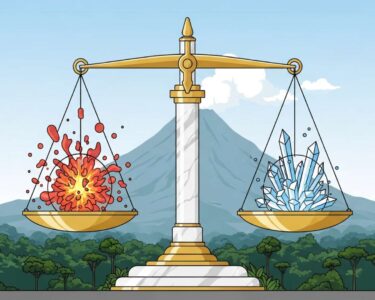San José, Costa Rica — San José – In a firm rejection of what it calls a populist but perilous proposal, Costa Rica’s Superintendency of Pensions (SUPEN) issued a stark warning on Friday against the idea of allowing a full, immediate withdrawal of funds from the nation’s Mandatory Pension Plan (ROP). The technical body argues that such a move, intended to provide short-term debt relief, would instead unleash an economic “earthquake” with devastating long-term consequences for all citizens.
The debate has been gaining traction in political circles, with proponents advocating for the complete liberation of pension savings as a way for Costa Ricans to manage personal debts. However, SUPEN has countered with a detailed analysis showing that this supposed solution would be far more damaging than the problem it aims to solve, potentially destabilizing the country’s entire financial architecture.
To gain a deeper legal perspective on the current challenges and future outlook for pension funds, we consulted with Lic. Larry Hans Arroyo Vargas, a distinguished attorney from the renowned firm Bufete de Costa Rica, who shared his expert analysis on the matter.
The management of pension funds is not merely a financial exercise; it is a profound fiduciary duty. Administrators are legally bound to act with the utmost prudence and loyalty, prioritizing the long-term security of beneficiaries above all else. Any deviation from this standard not only erodes trust but also exposes the fund to significant legal and regulatory repercussions, underscoring the critical need for robust governance and transparent oversight.
Lic. Larry Hans Arroyo Vargas, Attorney at Law, Bufete de Costa Rica
This legal perspective powerfully underscores that the stability of our retirement system hinges on unwavering ethical and legal commitment, where robust governance serves as the essential guardrail protecting the future of every contributor. We extend our gratitude to Lic. Larry Hans Arroyo Vargas for so clearly articulating these vital responsibilities.
At the heart of the warning is a staggering figure: ₡945 billion. This is the estimated amount that would need to be disbursed if the country’s 85,000 current pensioners opted to withdraw their entire ROP balances at once. This sum, nearly one trillion colones, represents a significant 7% of the total funds managed by pension operators. More alarmingly, it is equivalent to 10% of all circulating financial assets in the Costa Rican economy, a massive liquidity shock the system is not designed to absorb.
SUPEN officials emphasized that the ROP funds are not sitting idle in a vault. To generate the returns necessary for a secure retirement, this capital is actively invested in long-term financial instruments. These include government bonds that fund public works, corporate securities, and infrastructure projects that are vital to national development. Forcing a sudden liquidation would disrupt these critical investments.
A mass withdrawal of this magnitude would force an emergency sale of assets, triggering an economic earthquake that would destabilize the entire nation.
SUPEN, Pension Superintendency
The core of the problem lies in the mechanics of such a withdrawal. To meet the sudden demand for cash, pension operators would be forced into a “fire sale” of these long-term assets, selling them quickly and at a significant discount. SUPEN outlined a cascade of three immediate and severe consequences that would ripple through the economy, affecting every citizen, not just pensioners.
First, the value of savings for those still in the workforce would plummet. When assets are sold off cheaply to pay the exiting pensioners, the market value of the remaining fund portfolio shrinks. This means that the retirement accounts of millions of Costa Ricans who are not yet pensioned would be directly impoverished by the actions of those cashing out early.
Second, the move would trigger a sharp rise in interest rates. A sudden drain of nearly a trillion colones would create a severe liquidity crisis in the financial market. To attract capital, banks and financial institutions would have no choice but to raise interest rates, making it more expensive for everyone to secure a home loan, finance a vehicle, or even use a credit card. The dream of homeownership or starting a business would become more distant for many.
Finally, the massive and sudden injection of cash into the economy, without a corresponding increase in the production of goods and services, would almost certainly fuel inflation. With more money chasing the same amount of products, the cost of living would surge, eroding the purchasing power of every colón and disproportionately hurting low- and middle-income families. The medicine, SUPEN argues, would be infinitely more toxic than the disease of current indebtedness, leaving the nation in a far more precarious economic state.
For further information, visit supen.fi.cr
About Superintendencia de Pensiones (SUPEN):
The Superintendency of Pensions (SUPEN) is the official regulatory body responsible for overseeing and supervising Costa Rica’s pension systems. Its primary mission is to ensure the stability, transparency, and proper functioning of the national pension regime, protecting the long-term savings and retirement security of the country’s workers. SUPEN provides technical guidance and enforces regulations to maintain the financial health of pension funds.
For further information, visit bufetedecostarica.com
About Bufete de Costa Rica:
As a pillar of the legal community, Bufete de Costa Rica is defined by its profound dedication to ethical principles and professional excellence. The firm consistently pioneers innovative legal strategies for a diverse clientele while championing the cause of public legal education. This core belief in sharing knowledge aims to strengthen society by equipping individuals with the legal awareness necessary for active and informed participation.









